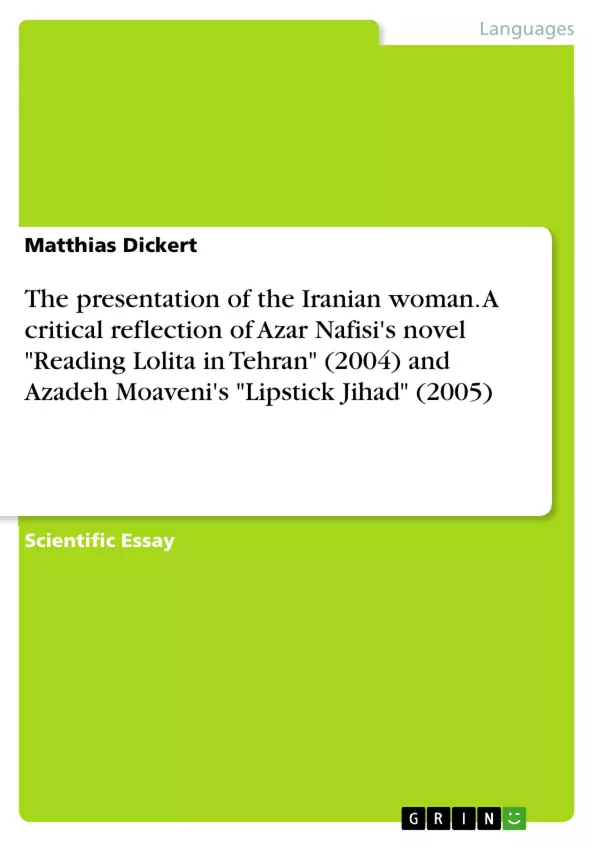Azadeh Moaveni' s novel "Lipstick Jihad" (2005) is a typical novel of female Muslim writers disposing of a Muslim and Western background. This (double) insight into two seemingly opposing worlds enables author and reader alike to get a deeper insight into Muslim characters who are often torn between these two extremes which many Muslim authors describe as a personal dilemma in form of a jihad. Jihad here is used it its basic meaning which corresponds a personal struggle based on a Muslim background (here the Iranian diasporic situation in the USA) which is accompanied by the nostalgia for and belonging to Iran as a homeland.
The hybrid which is a result from this and which is so typical for Muslim writing of the second generation in general is also reflected in "Reading Lolita in Tehran" (2004) the second novel analysed here. This 'hybrid condition' is strongly reflected in the personal, cultural and religious odyssey most Muslim characters experience. This especially goes for women since they are still portrayed in their inferior role.
The common basis of both novels can therefore be seen in the influence of the Iranian setting in general and the role of the Iranian Revolution and the emerging Iranian Republic in particular which both strongly shaped this nation and her inhabitants while also throwing light on the (mostly difficult) life in Iran.
It is also this specific situation of Iran which many female authors use as a setting which disposes of a dramatic background which is used as an underlying dramatic element for the narration as such.
Inhaltsverzeichnis (Table of Contents)
- The background of Iranian writing - a short postcolonial survey
- Forms: Narratological Categories for the Analysis of the Genre
- Islamic Spirituality and Transcendence
- Identity Formation as one Central Problem of Islamic Writing
- Identity as a Religious Matter: The Quest for the Meaning of Life
- Failure
- Powerlessness
- The Quest for a Meaning of Life
- Hybrid Description and Hybrid Identity under the Focus of Islam and Islamic Fundamentalism
- Close Analysis: Reading Lolita in Tehran
- Outlook Reading Lolita in Tehran
- Close Analysis: Lipstick Jihad (2005)
- Outlook: Lipstick Jihad
- Outlook
Zielsetzung und Themenschwerpunkte (Objectives and Key Themes)
This text explores the presentation of Iranian women in the novels Reading Lolita in Tehran (2004) by Azar Nafisi and Lipstick Jihad (2005) by Azadeh Moaveni. It critically analyzes the portrayal of female identity within the context of Iranian society, the Iranian Revolution, and the emerging Iranian Republic.
- The influence of the Iranian setting on the lives and experiences of Iranian women.
- The portrayal of female identity and emancipation under Islamic and Sharia rule.
- The complexities of navigating personal freedom within a society characterized by religious fundamentalism.
- The impact of the Iranian Revolution and the subsequent political and social changes on Iranian women.
- The hybridity of Iranian identity, navigating cultural and religious influences.
Zusammenfassung der Kapitel (Chapter Summaries)
The first chapter provides a brief postcolonial survey of contemporary Iranian writing, highlighting the themes of history, ethnicity, and the influence of Islam on personal and public life. The chapter then explores the evolving representation of female identity in Iranian literature, drawing comparisons to the Victorian novel and the role of women within Muslim societies. The second chapter introduces key narratological categories for analyzing the genre of Iranian writing, such as Islamic spirituality, identity formation, and the quest for meaning. The chapter delves into the complexities of hybrid identity, exploring the impact of Islamic fundamentalism on personal experiences and the struggle for personal freedom within a restrictive environment.
Schlüsselwörter (Keywords)
Key terms and themes discussed in this text include Iranian literature, female identity, Islamic fundamentalism, Sharia rule, Iranian Revolution, postcolonialism, hybridity, personal freedom, and the portrayal of Iranian women in contemporary writing.
Frequently Asked Questions
How are Iranian women presented in modern literature?
Contemporary novels like "Reading Lolita in Tehran" and "Lipstick Jihad" explore the struggle for personal freedom, the impact of the Iranian Revolution, and the complexities of female identity under Sharia rule.
What is the "hybrid condition" in Iranian writing?
It refers to the dual cultural identity of authors living in the diaspora (e.g., USA) while maintaining deep emotional and religious ties to Iran, often resulting in a "personal jihad" or struggle.
What are the main themes of Azar Nafisi's "Reading Lolita in Tehran"?
The novel focuses on the transformative power of literature, the oppression of women in post-revolutionary Iran, and the quest for identity within a restrictive political environment.
What does "Lipstick Jihad" by Azadeh Moaveni symbolize?
It symbolizes the daily resistance and personal struggle of Iranian women to maintain their individuality and modern lifestyle against the background of religious fundamentalism.
How does the Iranian Revolution influence these narratives?
The Revolution serves as a dramatic backdrop that shaped the nation's inhabitants, particularly women, by introducing new social, religious, and political constraints that define their lives.
- Quote paper
- Dr. Matthias Dickert (Author), 2016, The presentation of the Iranian woman. A critical reflection of Azar Nafisi's novel "Reading Lolita in Tehran" (2004) and Azadeh Moaveni's "Lipstick Jihad" (2005), Munich, GRIN Verlag, https://www.grin.com/document/338396



